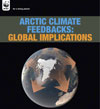 Sea level will rise by more than a metre by 2100 according to the authors of the third chapter in the World Wide Fund for Nature’s new Arctic report, introduced by Gareth a few days ago. Eric Rignot, one of the two authors of the chapter, is principal scientist for the Radar Science and Engineering Section at NASA’s Jet Propulsion Laboratory, Pasadena, Calif. The other author, Anny Cazenave, is an internationally renowned research scientist from France’s national centre for space studies.
Sea level will rise by more than a metre by 2100 according to the authors of the third chapter in the World Wide Fund for Nature’s new Arctic report, introduced by Gareth a few days ago. Eric Rignot, one of the two authors of the chapter, is principal scientist for the Radar Science and Engineering Section at NASA’s Jet Propulsion Laboratory, Pasadena, Calif. The other author, Anny Cazenave, is an internationally renowned research scientist from France’s national centre for space studies.
The value of the chapter is that it draws together, authoritatively and coherently, the evidence that points to considerably more sea-level rise over this century than projected in the 2007 IPCC Fourth Report (AR4). Happily politicians are taking IPCC reports much more seriously than in the past, but they should not rest on them. Their responsibility is to be up to date with what the science is saying now. The WWF report assesses the most recent science, and finds that the impacts of warming will be more severe than indicated by the IPCC.
What follows is a summary of the main points made by the chapter.

 A short item in today’s Herald
A short item in today’s Herald  The
The 
 Last week an essay — Why I Am A Climate Realist — by NZ CSC “science advisor” Dr Willem de Lange started popping up all over the crank web. I first spotted it
Last week an essay — Why I Am A Climate Realist — by NZ CSC “science advisor” Dr Willem de Lange started popping up all over the crank web. I first spotted it